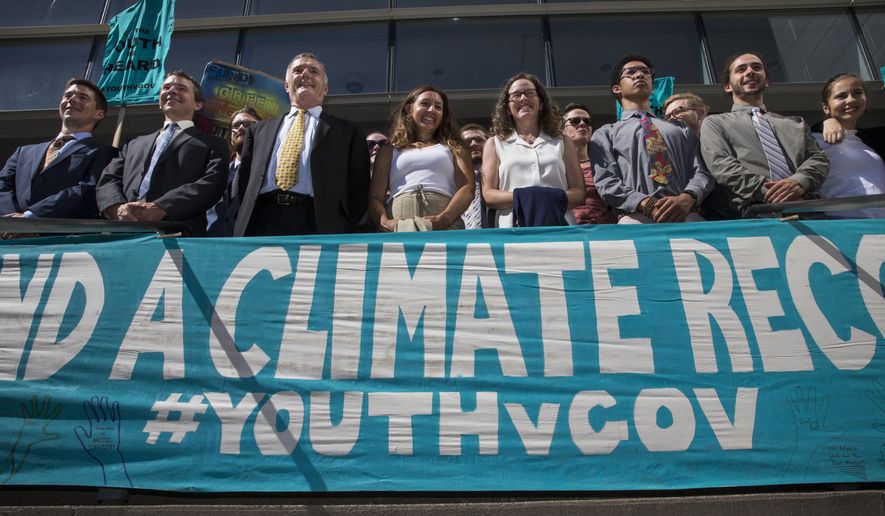The Ninth Circuit Court of Appeals threw out Friday the “children’s climate lawsuit,” ruling that the effort to force the federal government to take action on climate policy falls under the purview of the legislative and executive branches, not the judiciary.
The 2-1 decision in Juliana v. United States found that the 21 youth plaintiffs lacked standing to sue, agreeing with a lower court that they had “concrete and particularized injuries” stemming from federal climate policy, but that “claimed injuries were not redressable by an Article III court.”
“There is much to recommend the adoption of a comprehensive scheme to decrease fossil fuel emissions and combat climate change, both as a policy matter in general and a matter of national survival in particular,” said the 64-page ruling. “But it is beyond the power of an Article III court to order, design, supervise, or implement the plaintiffs’ requested remedial plan.”
In addition, “As the opinions of their experts make plain, any effective plan would necessarily require a host of complex policy decisions entrusted, for better or worse, to the wisdom and discretion of the executive and legislative branches,” said the opinion by judges Mary H. Murguia and Andrew D. Hurwitz.
In her dissent, Judge Josephine L. Staton argued that “the mere fact that this suit cannot alone halt climate change does not mean that it presents no claim suitable for judicial resolution,” and took a shot at the Justice Department, which fought the lawsuit.
“Seeking to quash this suit, the government bluntly insists that it has the absolute and unreviewable power to destroy the Nation,” Judge Staton said.
The lawsuit, filed in 2015 with the legal assistance of Our Children’s Trust in Eugene, Oregon, had survived longer than expected, defeating efforts by the Obama and Trump administrations to dismiss the case prior to the June 4 hearing before the Ninth Circuit.
Our Children’s Trust argued that the government “has violated the youngest generation’s constitutional rights to life, liberty, and property, as well as failed to protect essential public trust resources,” while the Justice Department countered that the plaintiffs claim “a previously unimagined constitutional right.”
The ruling comes as the second major legal defeats in as many months for climate activists. Last month, a judge ruled against New York Attorney General Letitia James in the high-profile “Exxon knew” case, rejecting arguments that ExxonMobil misled investors and consumers on climate change.
Julia Olson, chief legal counsel for Our Children’s Trust, said the plaintiffs would ask for the full court to review the decision, describing the case as “far from over.”
“This decision gives full unfettered authority to the legislative and executive branches of government to destroy our country, because we are dealing with a crisis that puts the very existence of our nation in peril,” said Kelsey Juliana, the 23-year-old named plaintiff, in a statement.
Juliana v. United States is far from over and the 21 youth plaintiffs will be asking the full 9th Circuit to review today’s decision and its catastrophic implications for our constitutional democracy. Press release: https://t.co/CDcMtrBBhE #youthvgov
— Our Children’s Trust (@youthvgov) January 17, 2020
“The court correctly understood that a lawsuit aimed at imposing a national plan to eliminate fossil fuel emissions and reduce atmospheric carbon dioxide would push the court far beyond its constitutional powers” - CEI’s Sam Kazman https://t.co/IxRB8Yoo96
— Competitive Enterprise Institute (@ceidotorg) January 17, 2020
Competitive Enterprise Institute general counsel Sam Kazman applauded the result, saying that the lawsuit “would push the court far beyond its constitutional powers,” but that it was unfortunate that the court “summarized the scientific evidence on climate change in such apocalyptic terms.”
“The Department of Justice should have made clear that its failure to contest this evidence did not mean that the evidence was incontestable,” said Mr. Kazman. “Hopefully, future litigation on this issue will involve a more measured assessment of climate reality.”
• Valerie Richardson can be reached at vrichardson@washingtontimes.com.




Please read our comment policy before commenting.